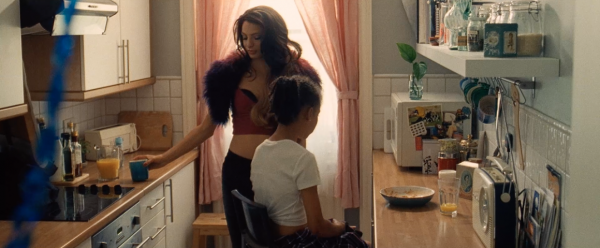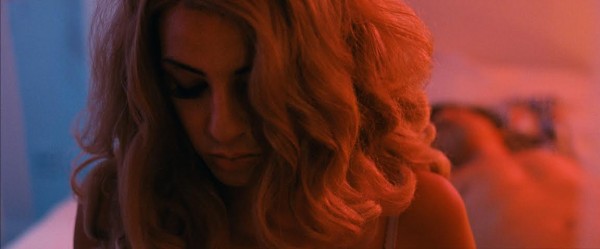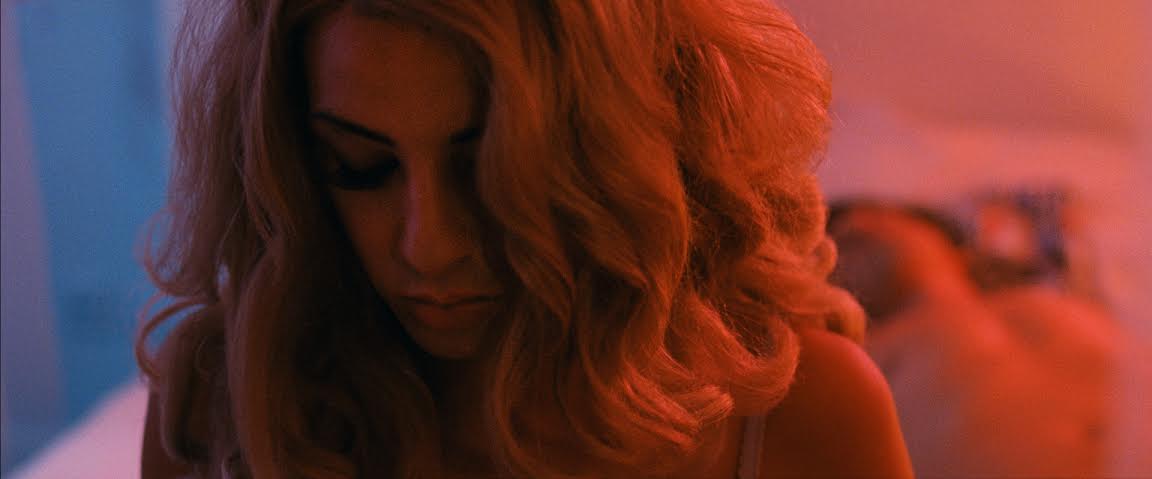
Roxanne, a short film about a trans sex worker who reluctantly takes in an abandoned child, was recently selected as a Vimeo Staff Pick and has been accepted at 14 international film festivals, including two Oscar qualifying fests. It will soon be made into a feature film. The following interview was conducted by Sarah and Caty with director Paul Frankl over e-mail.
Roxanne is played by a genderfluid drag queen performer, Miss Cairo. That adds an interesting layer to her portrayal of Roxanne, because a lot of trans workers exist in gender variant spaces. Sarah noted that Roxanne is a character she could actually imagine working alongside her in a trans parlor, and she’s never seen that done on film before. Can you tell us more about this casting choice?
Casting someone of fluid gender was not something I initially set out to do. I auditioned eight trans and genderfluid women (because I knew I wanted someone from the trans community, as an ethical choice), and of them, Cairo was the one I wanted for the role. We then had many discussions around gender (her own and Roxanne’s) and it was her who brought the genderqueer aspect, which I wanted to embrace and thought made a great extra dynamic to the film. Exploring someone as genderfluid is something that’s rarely seen in the media (even less than representations of trans people given the rise in awareness over the last couple of years), and something I think is definitely worth exploring more in film.
Another thing we loved about the short was the way you holistically represented all the aspects of Roxanne’s life—her morning run was given just as much if not more film time as her nightly sex work. In your Hunger TV interview, you stated that, “by pushing the fact that she is a trans sex worker to the background, I hoped to humanise her and make her a character that everyone can relate to.” Why do you think it’s so hard for mainstream audiences to see beyond the label of “trans sex worker” and understand trans workers as whole persons beyond their jobs and gender identities?
I think films can allow people to connect with others on an emotional level, in a way they can’t through many other mediums. This is why it’s a great way to help change attitudes towards trans people and sex workers, because the audience can see their hopes, fears, and daily life—things that we all have—and relate to them. Too often, trans sex workers (and sex workers in general) are presented as victims, crazy, or drug addicts. I wanted to show a trans sex worker who was in control of her life—with her own issues, but ones that don’t revolve around her gender or career. In this way I hoped to be able to change some attitudes towards sex workers of those watching. Hopefully, this can be done more (to a wider audience) with the feature.
We were surprised by Roxanne’s agreement with Lily’s statement that she puts on her makeup to be someone else, rather than telling Lily that the makeup is just part of being the woman she is. In the Hunger TV interview, you also said that “[p]art of the key to the film was differentiating between the light and dark aspects to Roxanne’s life. We wanted to visually separate the day from the night scenes, and show the duality of her life—her real self vs. her masked self…” What is Roxanne’s “masked self”? A common stereotype about trans women holds that they are pretenders to womanhood. How is Roxanne not being her real self when she puts on makeup and displays her femininity?
Her ‘mask’ relates to the glamorous role she feels she has to play on the scene. The line about her “being someone else” when she puts on all the makeup, refers to her playing this glamorous person that doesn’t connect to her daily self—the one you see in the day time, who has interests outside the clubbing scene. It can be lonely to present a beautiful and glamorous person all the time. This is her mask—it has nothing to do with her womanhood or transness. But I think in general, makeup does disguise who you are somewhat—it physically changes the way you look. She feels she has to portray this person in order to get clients, rather than presenting herself as the sensitive, (hurt) person she really is.

Something we both liked about the film was the way it put a trans woman sex worker into a maternal role. Trans women are almost never seen as mothers and sex workers are almost always cast as bad ones. The goons at the beginning of the film, the ones Roxanne saves Lily from, scoff, “What are you, her mother”—representing the mainstream’s inability to conceive of trans sex workers as maternal beings. Can you tell us a bit more about making a film about a trans woman sex worker nurturing a child?
The feature film really is a journey for Roxanne to rediscover family, and having loving platonic relationships in her life. Lily is a great way to force this journey to happen. A child is someone vulnerable, who can’t look after themselves. Roxanne is forced to bring out a more maternal side to her personality, and reevaluate her relationships with those around her.
You characterize Roxanne as a “lonely and isolated person” who “can no longer act as selfishly, without putting the girl at risk” when she decides to take care of Lily. Why do you think Roxanne is lonely and selfish? That description also hearkens back to stigmatized portrayals of both sex workers and trans women—sex workers are supposed to be lonely because our job ruins our ability to have authentic romantic and platonic relationships, trans women are supposed to be isolated freaks, and both trans women and sex workers are seen as self-centered deviants. When we watched the film, we didn’t really think of Roxanne as selfish just because she was understandably irritated about cereal being spilled all over her kitchen counter or because she needed to use her bedroom to work and make money for both of them. We saw it more as a reasonable adjustment to living with and supporting another person after having to focus on one’s own individual survival.
Roxanne is indeed an isolated and lonely person, however this doesn’t have anything to do with the fact she’s a sex worker, or trans, and I tried very hard to avoid connecting the two in the film. The simple fact of the matter is, films about people that are perfectly happy and have no problems, aren’t very interesting to watch! She’s isolated because she’s built walls of protection around herself that result in her pushing away those around her (until she takes in Lily). Many people have this problem, and I feel it’s somewhat ‘universal’—we all build up walls to protect ourselves, especially when we go through pain or difficult times. Roxanne’s hardness comes more from her own coping mechanism, and her unwillingness to connect with others (going back to her sister and family). This is explored much more in the feature film—her survivor’s instinct, and the events that took place in her past that made her the way she is (which have nothing to do with her being trans or a sex worker, but I can’t reveal what they are just yet!).
There’s also the matter of sex work perhaps not being a suitable activity to undertake around children. For her to bring home a client and make an 11-year-old girl listen to her having sex is a selfish act. Again, it’s not to do with sex work itself, it’s to do with her having little respect for the feelings of the child who’s been thrust into her care.

Roxanne is shown picking up clients at clubs and taking them home to her apartment. This form of full service sex work, free-styling, is a relatively dangerous one, especially for a trans women, and one that’s not as common since the advent of internet advertising. Why did you decide on Roxanne doing this sort of work in particular?
In terms of picking up clients in clubs, this is something I’ve seen personally (it was about 10 years ago, but the internet still existed!), and it just makes for a more filmic/visual way of telling the story rather than her sat at a computer all the time. But it also builds the audiences understanding of her isolation—clubs can be very isolating places. While of course it happens less these days (and is in fact illegal) it does still happen.
We’re so excited about your plans to make a feature film about Roxanne. Can you tell us more about that project?
The feature will be based on the same concept of the short, only with more of a look into Roxanne’s past, her relationships with those around her (including other sex workers) and her personal development. The unlikely pair will be forced on journey of discovery, in an attempt to find Lily a home, but also a personal one where they are forced to learn to live together and to reflect on their lives and actions.

Interesting interview, I really liked the film. The ending is kind of abrupt, as far as the pacing & structure of the rest of the film, but I can’t wait for the longer version! I’m really excited for that!
I’m a woman and I feel that my alter ego can’t occupy the same space as my true self. Which isn’t an interesting realization, many people hide behind something to prevent other people from seeing their true selves. Its not surprising that the character would agree because her gender identity isn’t her alter ego. The point of this is to get audiences to relate. Its very relatable to build walls, she’s not being fraudulent shes being genuine.
Now what would be an interesting is if there was a Clark kent/superman thing going on. Obviously not suitable for this film but it would be interesting to show how someone who feels most authentic when they’re the nighttime identity copes with the alter ego being the day time one. Clark kent was superman’s alter ego, his mask was his glasses and his journalist job and his 3 piece suit. He wore his mask so that he could protect others from finding out his true identity was superman. Think about the lengths people go to to prevent their loved ones from realizing their full potential.